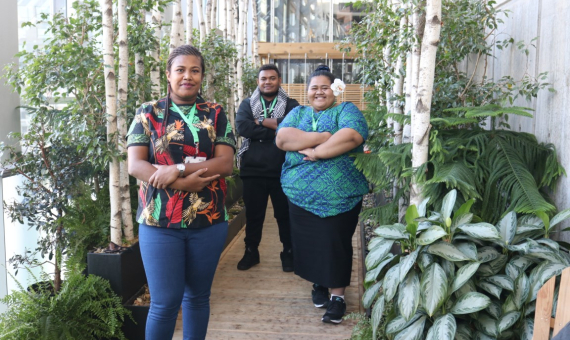Youth representatives from Pacific islands attending the 15th Conference of the Parties to the Convention on Biological Diversity (COP15) in Montreal Canada this week, have issued a challenge to world leaders present.
“Please take the time to come and visit our Pacific countries so you will know what we are talking about. Sitting here and talking about the issue is very different to what would happen if they come and experience the struggles and the tough reality for us on the ground,” said Camari Divuniwaqa, of Fiji.
In the Solomon Islands, that “reality” is very grim, said Rodrick Holness Rollands.
“We live the devastating impact of ocean acidification, our corals are dying, islands are sinking, we see dying mangroves, we are losing corals and we worry about what the future holds,” he said.
“In some cases, our cultures are attached to these things so these are also impacting on our cultures. Our food security is under threat, our marine ecosystems are being damaged, our way of life is impacted.”
For Marinda Imakulata Tagiilima, of Samoa, she said this is why world leaders must agree and endorse a post 2020 Global Biodiversity Framework by the end of the week, that is responsive to the lived reality of Pacific countries.
“I hope they see that there is a biodiversity crisis, there is a climate crisis, and they really need to directly address them. We don’t need any more words, we need more action, we don’t need any more promises, we want them to deliver now,” she said.
Divuniwaqa, Rollands and Tagiilima were chosen from hundreds of applicants to join the Global Youth Biodiversity Network in Montreal where the negotiations for a new biodiversity framework continues. The conference is taking place amidst a biodiversity crisis where more than 70 percent of the planet’s land has been transformed, more than 60% of the oceans have been impacted and more than 80% of wetlands have been lost, while more than one million species face extinction.
The Youth representatives say the Pacific communities are at the forefront of the impacts of the biodiversity crisis.
“As young people, the impact of what is happening now, which as you all know, is not good. We are heading for a perilous future if we don’t act now. Our lives have already been impacted by biodiversity loss, and while we are doing so much back home in terms of conservation, we feel it is not enough. We have come with a message from our countries and we want to make their concerns known,” said Divuniwaqa.
The Pacific has four key messages and high on the priority list is the critical importance of an effective and coherent Global Biodiversity Framework that reflects the needs of Pacific communities. Rollands said the Pacific youth have a key role to play.
“We have some serious concerns about the loss of biodiversity in our home countries we have come here to voice in this global forum. We know that as young people, it is our generations that are going to be impacted the most. If we don’t speak up now for ourselves, we will not have a future,” he said.
“So we are here to engage and fight for our communities’ back home. We are the future and we have to make sure our voice is at the table and is heard. We need to have one strong voice, one that must be coherent and inclusive and takes into account all the concerns of our people back home.”
Tagilima agrees.
“We are very much on the front line of the climate change impacts and biodiversity loss. We live and breathe the negative consequences of something our people have had very little contribution to,” she said. “Our leaders today need to take more proactive action, less talking but more action. We need them to walk the talk, consider the concerns of all the nations, especially small countries as we are at the forefront of these impacts.”
Aside from amplifying our Pacific voice at COP15, all of them agree that they also have some work to do back home to get more youth to be involved in biodiversity conservation advocacy.
“It is a privilege to be here, especially knowing that there are only a few of us representing the Pacific but we need more youth to participate, we need more Pacific representation here,” said Divuniwaqa. “We want to take what we have learnt here and use it back home to build more capacity so our voice is strengthened. We want a strong network of youth to advocate for our Pacific biodiversity priorities.”
They hope to return home and set up a Pacific chapter of the Global Youth Biodiversity Network.
SOURCE: SPREP/PACNEWS













